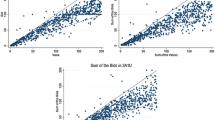Abstract
Consider an auction or fair division game where every bidder knows his true value of the single object but is only incompletely informed about the true values of his competitors. By imposing the axiom of envy freeness with respect to stated preferences the set of pricing rules is restricted to the prices between the highest and second highest bid. Whereas for auctions one also can satisfy incentive compatibility, the same is not true for fair division games. We analyse and compare the different pricing rules, partly incentive compatible and partly not, by deriving the optimal bidding strategies. By comparing the payoff expectations induced by the various pricing rules we can prove directly a special equivalence statement saying that expected payoffs do not depend on the pricing rule. It is interesting that in fair division games equivalence of pricing rules is only valid if information is sufficiently incomplete.
Similar content being viewed by others
References
Crawford VP (1977) A game of fair division. Rev Econ Stud 44: 235–247
Crawford VP, Heller WP (1979) Fair division with indivisible commodities. J Econ Theory 21: 10–17
Damme E van (1984) Auctions and fair division. Discussion Paper, Dept. of Math. and Comp. Science, University of Technology, Delft (November 1984)
Engelbrecht-Wiggans R (1980) Auctions and bidding models: a survey. Manage Sci 26: 119–142
Fehl U, Güth W (1985) Internal and external stability of bidder cartels in auctions and public tenders — A comparison of pricing rules. (Unpublished manuscript, Staatswissenschaftliches Seminar, Universität zu Köln, Haedenkampstr. 2, D-5000 Köln 41)
Finsinger J (1985) Die Ausschreibung. Jahrbuch für Sozialwissenschaft 36:302–321
Gandenberger O (1961) Die Ausschreibung. Quell und Meyer, Heidelberg
Güth W (1979) Kriterien für die Konstruktion fairer Aufteilungsspiele. In: Albers W, Bamberg G, Selten R (eds) Entscheidungen in kleinen Gruppen. Math Syst Econ 45:57–89
Güth W (1986) Auctions, public tenders, and fair division games — An axiomatic approach. Math Soc Sci 11:283–294
Güth W, Schwarze B (1983) Auctioning strategic roles to observe aspiration levels for conflict situations. In: Tietz R (ed) Aspiration levels in bargaining and economic decision making, Lecture notes in economics and mathematical systems, vol. 213, pp 217–230
Güth W, Schmittberger R, Schwarze B (1983) A theoretical and experimental analysis of bidding behavior in Vickrey — auction games. Z Gesamte Staatswiss 139:269–288
Harsanyi JC (1968) Games with incomplete information played by ‘Bayesian’ players. Manage Sci 14: 159–189, 320–344, 486–502
Holt CA (1980) Competitive bidding for contracts under alternative auction procedures. J Pol Econ 88: 436–442
Kuhn HW (1967) On games of fair division. In: Shubik M (ed) Essays in mathematical economics in honor of Oskar Morgenstern. Princeton University Press, Princeton, NJ
Milgrom PR, Weber RJ (1982) A theory of auctions and competitive bidding. Econometrica 50: 1089–1122
Moulin H (1984) The conditional auction mechanism for sharing a surplus. Rev Econ Stud II:157–170
Myerson RB (1981) Optimal auction design. Math Oper Res 6: 58–73
Ortega-Reichert A (1968) Models for competitive bidding under uncertainty. Technical Report no. 103, Stanford University, Dep. of Operations Research
Raiffa H (1982) The art and science of negotiation. Cambridge (Mass.)
Riley JG, Samuelson WF (1981) Optimal auctions. Econ Rev 71: 381–392
Steinhaus H (1948) The problem of fair division. Econometrica 16: 101–104
Vickrey W (1961) Counterspeculation, auctions, and competitive sealed tenders. J Finance 16: 8–37
Author information
Authors and Affiliations
Additional information
The authors gratefully acknowledge the helpful comments of an anonymous referee
Rights and permissions
About this article
Cite this article
Güth, W., van Damme, E. A comparison of pricing rules for auctions and fair division games. Soc Choice Welfare 3, 177–198 (1986). https://doi.org/10.1007/BF00433534
Received:
Accepted:
Issue Date:
DOI: https://doi.org/10.1007/BF00433534




